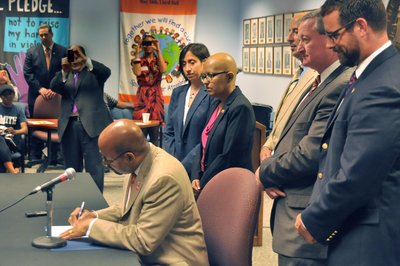Philadelphia made history this week as Mayor Michael Nutter signed into law a landmark LGBT-rights bill. Among its provisions, Councilman Jim Kenney’s legislation will instate a tax credit to companies that launch domestic-partner benefits programs and that offer transgender-specific health-care coverage, both programs that are the first of their kind in the nation. The legislation also revamped the city’s health plan to prevent discrimination against transgender non-union city workers. City buildings will also now be required to provide gender-neutral bathrooms, and all city forms will be gender-neutral. The city’s nondiscrimination ordinance will be amended to clarify that employment discrimination based on one’s gender presentation is illegal and to mandate that public accommodations must permit individuals to use a restroom in accordance with their gender identity. The legislation passed in a 14-3 victory April 25, and Nutter gave his final approval in a May 9 City Hall ceremony that was packed with LGBTs and allies. LGBT activist Kathy Padilla said she has spent 10 years advocating for such legislation and began meeting with Gloria Casarez, the city’s director of LGBT affairs, in 2008 to bring the bill forward. When the vote was called, Padilla said she was excited to see her hard work and that of others come to life. “I was overjoyed. Philadelphia is once again leading the country,” she said. Kenney said he was happy the bill passed with such a considerable margin, although he was hoping for it to have been unanimous. “I kind of hoped we would have a unanimous vote, but we didn’t and not many votes that are groundbreaking get that, so I understood,” he said. “But I was happy that we had a Republican vote. I was very pleased with the outcome.” Republican Dennis O’Brien voted for the measure, while Democrat Bill Green opposed, joining Republicans David Oh and Brian O’Neill. Casarez said the bill affirms many of the endeavors the city was already undertaking. “We were already updating forms in departments, creating single-use bathrooms when renovating older city buildings, etc,.” she said. “The meaning here is that it’s now codified. It’s law.” Padilla has been contacted by transgender-rights activists in other states about the legislation and said its adoption was a great demonstration of a city working towards transgender equality. She added that the legislation could put Philadelphia at the very top of the Human Rights Campaign’s Municipal Equality Index; last year the city missed points for transgender health coverage for city employees. “I think this will put us up top in the country and even earn us bonus points. This could create a domino effect,” she said. Casarez added that Philadelphia is now the largest city in the United States to offer transgender-inclusive health care to its employees, joining just a handful of other cities and 700 U.S. companies. Kenney said the bill not only highlights Philadelphia’s LGBT-friendly environment, but also demonstrates its leadership. “It shows Philly to be a vanguard of civil rights in the country’s birthplace of democracy,” he said. “We have gone through an evolution on civil rights and have the most inclusion that we possibly can. It is all about life, liberty and pursuit of happiness and that applies to everyone, regardless of how you identify.”
Newsletter Sign-up
